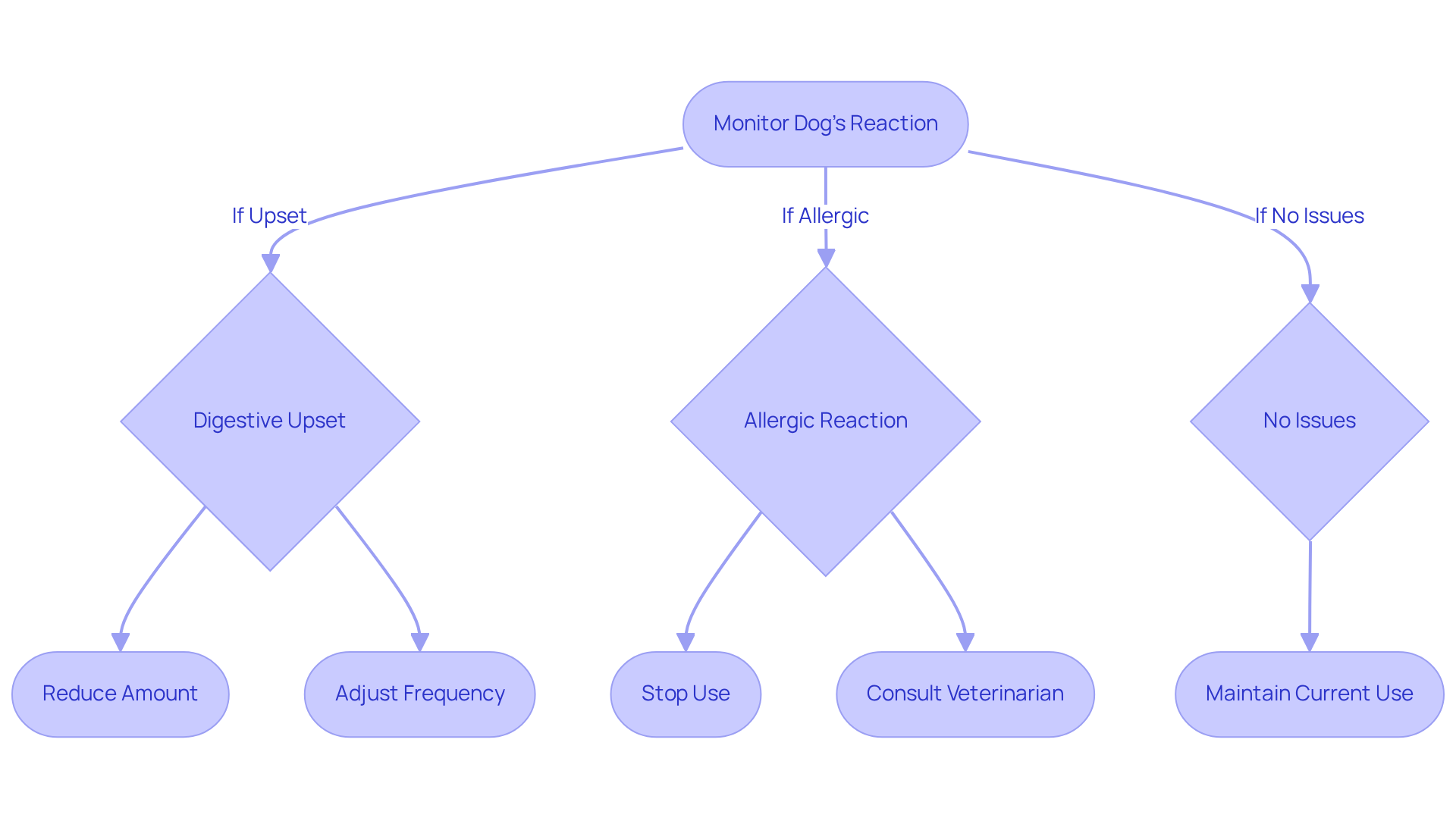Can Dogs Eat Coconut Oil? Steps for Safe Introduction
Overview
Dogs can indeed enjoy coconut oil, but it’s essential to introduce it with care to prevent any digestive issues or unwanted weight gain. We understand how much you cherish your furry family members, and that’s why consulting with a veterinarian before making any dietary changes is so important.
- Gradually increasing the dosage while keeping a watchful eye for any adverse reactions can help ensure that this addition is both safe and beneficial for your dog’s diet.
- Remember, your pet’s well-being is our top priority, and we’re here to support you in creating a nurturing environment for them.
Introduction
Coconut oil has become a beloved supplement among pet owners, celebrated for its potential health benefits for our furry family members. With its rich composition of medium-chain triglycerides (MCTs), many pet parents wonder if adding this oil to their pets’ diets is a safe and effective choice.
While the advantages are certainly appealing—from enhanced skin and coat health to digestive support—it’s essential to consider the important factors and risks involved.
How can dog owners confidently introduce coconut oil into their pets’ diets while ensuring their well-being? This guide offers a compassionate, step-by-step approach to safely harnessing the benefits of coconut oil, all while minimizing potential drawbacks.
Understand Coconut Oil: Benefits and Risks for Dogs
Coconut oil is rich in medium-chain triglycerides (MCTs), leading many pet owners to ask, can dogs eat coconut oil to enjoy the numerous benefits it offers for their furry family members? Here are some of the wonderful advantages it can provide:
- Improved Skin and Coat Health: Coconut oil can soothe dry skin and enhance coat shine, thanks to its moisturizing properties.
- Digestive Aid: It may support digestion and nutrient absorption, making it a great choice for dogs experiencing digestive issues.
- Anti-inflammatory Properties: With its anti-inflammatory effects, coconut oil can be beneficial for conditions like arthritis.
- Antibacterial and Antifungal Properties: The oil’s natural antibacterial and antifungal properties can help prevent infections and promote overall skin health.
While there are many benefits, it’s important to be aware of the potential risks:
- High-Calorie Content: Coconut oil is calorie-dense, which can lead to weight gain if not monitored. It contains over 90% saturated fat, with one tablespoon holding about 100 calories.
- Digestive Upset: Introducing coconut oil too quickly can lead to diarrhea or an upset stomach. It’s best to start with a small amount and gradually increase the dosage to minimize these risks.
- Allergic Reactions: Some dogs may be allergic to coconut oil, resulting in symptoms like itching or gastrointestinal distress. Always consult with a veterinarian before determining if can dogs eat coconut oil in your dog’s diet.
Veterinarians recommend starting with one-fourth teaspoon daily for small canines, and one teaspoon to one tablespoon for larger breeds, adjusting based on individual tolerance and health conditions. It’s essential to monitor for any negative reactions, especially in dogs with pre-existing medical conditions. Remember, treats should not exceed 10% of a dog’s daily intake, and choosing unrefined, virgin, or cold-pressed oil ensures the best quality for your beloved pets.

Step-by-Step Guide to Introducing Coconut Oil to Your Dog
- Consult Your Veterinarian: Before introducing palm oil into your furry family member’s diet, it’s essential to have a heartfelt discussion with your veterinarian. This step is crucial to ensure it aligns with your dog’s specific health needs, especially for those with prior health issues or those that are overweight. Given that 54% of dogs in North America are considered overweight or obese, this consultation becomes even more important to safeguard their well-being.
- Choose Quality Oil: Opt for organic, virgin oil derived from coconuts to guarantee the highest quality and nutritional benefits. Virgin oil retains more nutrients compared to refined options, making it a nurturing choice for your pet’s health.
- Start Small: Begin with a conservative amount, such as 1/4 teaspoon for small canines and 1 teaspoon for larger breeds. This gradual introduction helps assess your dog’s tolerance and minimizes the risk of digestive upset. Alternatively, consider using 1 tablespoon per 30 pounds of body weight daily, offering a broader perspective on dosage options.
- Mix with Food: To enhance flavor and assist digestion, incorporate the oil into your dog’s regular meal. This method not only makes it more appealing but also ensures easier consumption for your beloved pet.
- Monitor Reactions: Keep a close eye on your dog for any signs of digestive issues or allergic reactions in the days following the introduction. Symptoms to watch for include diarrhea, vomiting, or itching, which may indicate intolerance. While palm oil can help maintain a healthy body weight in dogs, it’s vital to remember that excessive consumption could lead to digestive upset.
- Gradually Increase the Amount: If your dog shows no adverse reactions, you can gradually increase the dosage to about 1 teaspoon per 10 pounds of body weight. Adjust the quantity according to your dog’s size and overall condition, ensuring you remain within safe limits for their health.
- Maintain Regular Monitoring: Continue to observe your dog’s well-being and behavior after introducing palm oil. Regular monitoring allows you to make necessary adjustments to the dosage, ensuring your pet remains healthy and happy. Remember, consulting a veterinarian is always advised to ensure the suitability of oil for your dog’s specific health needs.

Monitor and Adjust: Troubleshooting Coconut Oil Introduction
If your dog experiences any negative reactions after introducing coconut oil, it’s important to evaluate if can dogs eat coconut oil safely. Here are some steps to consider:
- Reduce the Amount: If your furry friend shows signs of digestive upset, like diarrhea or vomiting, gently decrease the amount of coconut oil and reintroduce it gradually. Experts recommend starting with small doses of coconut oil—about 1/4 teaspoon for small dogs and up to 1 tablespoon for larger breeds—to determine if can dogs eat coconut oil without causing gastrointestinal disturbances. According to Dr. Whittenburg, administering oil from palm fruits can lead to weight gain and digestive issues, so careful observation is essential.
- Monitor Diet: Ensure that your dog’s overall diet is balanced and not contributing to any digestive woes. Sometimes, other dietary changes can lead to upset stomachs, so it’s vital to evaluate all food sources.
- Check for Allergies: If your dog experiences skin irritations or digestive issues, stop using the oil and consult your veterinarian to rule out allergies. Symptoms of an adverse reaction can include loss of appetite and lethargy, which should be taken seriously. Dr. McCullough notes that while allergies to the oil are rare, they can occur, so it’s crucial to remain attentive.
- Adjust Frequency: Instead of daily use, consider administering the oil a few times a week. This approach may help alleviate any digestive issues while still providing some benefits of the oil.
- Keep a Log: Maintain a record of your dog’s reactions and any changes in behavior or health. This log can be invaluable for discussions with your veterinarian during follow-up visits, helping to tailor dietary recommendations to your dog’s specific needs. Additionally, long-term feeding of coconut oil can lead to obesity and pancreatitis, so it’s essential to consult with your veterinarian regarding whether can dogs eat coconut oil before making any significant dietary changes. Remember, your pet’s health and happiness are what truly matter.

Conclusion
Introducing coconut oil into your dog’s diet can bring about a multitude of health benefits, but it requires thoughtful consideration and a careful approach. It’s essential to understand the advantages, such as improved skin health and digestive support, alongside the potential risks, including weight gain and allergies. By consulting your veterinarian and following a structured introduction process, you can ensure that your furry family member safely enjoys the benefits of coconut oil.
Key aspects to keep in mind include:
- Starting with small amounts
- Monitoring for any adverse reactions
- Gradually adjusting the dosage based on your dog’s unique tolerance
It’s also vital to use high-quality, unrefined coconut oil while maintaining a balanced diet to prevent any digestive issues. By being attentive and proactive, you can make informed decisions that support your dog’s health and overall well-being.
Ultimately, the safe incorporation of coconut oil into your dog’s diet can significantly enhance their quality of life when approached thoughtfully. You’re encouraged to prioritize your dog’s health by seeking professional advice, observing their reactions, and adjusting the oil’s usage as needed. Taking these steps not only promotes a healthy lifestyle for your dog but also strengthens the bond between you and your beloved pet through mindful care and attention.
Frequently Asked Questions
What are the benefits of coconut oil for dogs?
Coconut oil can improve skin and coat health, aid digestion, provide anti-inflammatory benefits, and offer antibacterial and antifungal properties.
How does coconut oil improve skin and coat health in dogs?
Coconut oil soothes dry skin and enhances coat shine due to its moisturizing properties.
Can coconut oil help with digestive issues in dogs?
Yes, coconut oil may support digestion and nutrient absorption, making it beneficial for dogs with digestive problems.
What anti-inflammatory benefits does coconut oil provide for dogs?
Coconut oil has anti-inflammatory effects that can be helpful for conditions such as arthritis.
Are there any risks associated with giving coconut oil to dogs?
Yes, the risks include high-calorie content leading to weight gain, potential digestive upset if introduced too quickly, and possible allergic reactions in some dogs.
How many calories are in coconut oil?
Coconut oil is calorie-dense, containing over 90% saturated fat, with one tablespoon holding about 100 calories.
How should coconut oil be introduced into a dog’s diet?
It’s best to start with a small amount and gradually increase the dosage to minimize the risk of digestive upset.
What are the recommended dosages of coconut oil for dogs?
Veterinarians recommend starting with one-fourth teaspoon daily for small dogs and one teaspoon to one tablespoon for larger breeds, adjusting based on individual tolerance.
What should be monitored when giving coconut oil to dogs?
It’s essential to monitor for any negative reactions, especially in dogs with pre-existing medical conditions.
What type of coconut oil is best for dogs?
Choosing unrefined, virgin, or cold-pressed coconut oil ensures the best quality for pets.







